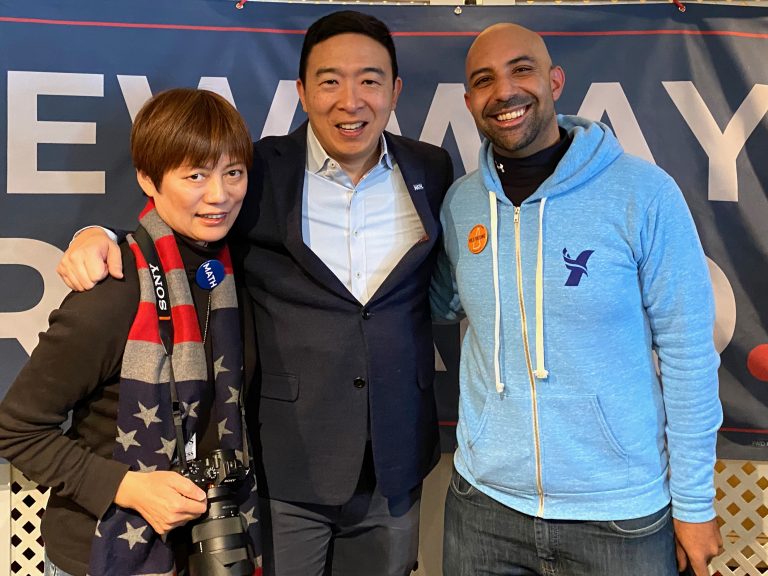
My Yang Gang Diary is a documentary written, directed, filmed, edited and produced by Ching Juhl. The film portrays the 2020 campaign of Democratic presidential candidate Andrew Yang. The fascinating trait, is that the storytelling occurs through the the eyes of his supporters, known as the “Yang Gang.”
Juhl documents her one year journey with members of the Yang Gang across 12 cities in the U.S.A. Although Andrew Yang suspended his presidential campaign in February 2020, his Humanity Forward movement carries on his ideals and vision for America’s future. His political journey has just began, since Andrew Yang is running for New York City mayor 2021, and Ching Juhl might continue her cinematic chronicle.
So far My Yang Gang Diary has gathered attention around the festival circuit, winning Best Documentary Feature at the Rome International Film Festival 2021; becoming a finalist at the New York Cinematography Awards and the New York Movie Awards; as well as being in the line-up of the Los Angeles Women’s International Film Festival, the Montreal Independent Film Festival and the Toronto Documentary Feature & Short Film Festivals.
The entire film was shot using an iPhone 11Pro, which is Juhl’s forte — since she is an expert of smartphone filmmaking. In fact, she is the founder of Juhl Media, and she has created and published more than 650 videos on social media, with topics ranging from current events to live interviews, music productions to how-to videos. Furthermore, Ching Juhl has conducted Smartphone Film Production workshops at the Clubhouse, MG Multimedia Group and Touro College.
However, the very life of the Shanghai-born-video-polymath is cinematic per se. At the age of 6, Ching Juhl experienced China’s Cultural Revolution, at 17 her musical skills allowed her to join the Chinese Army Orchestra, and at 20 years old she received a full scholarship from Shanghai Conservatory of Music. The Chinese-American filmmaker, video-journalist, musician and YouTube content creator, conquered her American dream just a few years later when she received scholarships from Indiana University for graduate work for her viola performance. Recognition arrived briefly after, as Juhl won a top prize at Giuranna International Viola Competition, that allowed her to buy her first video camera. Still in her twenties, while developing her filmmaking craft, Juhl had become a music educator and concert violist, playing with Phoenix Symphony, Jade String Trio as well as back up with Rod Stewart, Dionne Warwick and Perry Como.
Her dense creative existence was spent between the USA — with New York being her current home — and her multiple travels across the globe where she has performed. Juhl taught music at St. Joseph’s College and she has been teaching violin and viola at Music Studio Manhattan since 2001. After 15 years of teaching at St. Joseph’s College, Ching Juhl decided to quit her job, to dedicate herself fully support Andrew Yang’s campaign.
In this exclusive interview she shares the making of My Yang Gang:
What fascinated you about Andrew Yang the political figure, and the social phenomenon that revolved around him?
My first experience with Andrew Yang was in May of 2019 during his “Humanity First Rally” in New York City. Before this I didn’t really know who Yang was, so I attended the rally mostly out of curiosity and without expectations. My first impression of Yang himself was honestly not that impressive, but what really captured my attention was the crowd that had come to see him. The sight of hundreds of people young and old, black, brown and white, was very touching to me, and I began interviewing people in the crowd with my iPhone video camera to see what they liked so much about this man. Three weeks later, I was invited to video one of his fundraising events, and met Andrew Yang in person for the first time. The event was very intimate, with only around 20 people in the room, and I was impressed by his smart ideas and open discussions with us about how he planned to win the race. I received a copy of his book “The War on Normal People” that night, and after I read it I was sold.
In your film we see how some former republican supporters switched to Andrew Yang’s vision, how did they explain this change?
I think a unique quality around Yang’s campaign was that it truly included people from all walks of life and political backgrounds. On my journey I met many dedicated members of the Yang Gang who had previously been Republicans. Jack Chen, a data engineer in New Hampshire, had been a lifelong Republican before he also became inspired by Yang’s book “The War on Normal People”. He, with a bad hip, ended up canvassing house-to-house in New Hampshire with me, and even opened up his home to host and feed many Yang Gang during the campaign. Fred Ramey, a trucker from Arizona, had been planning to vote for Trump in 2020, but also became a member of the Yang Gang after meeting and talking with Yang. He appreciated Yang’s willingness to approach problems with innovative solutions and Yang’s approach of human-centred capitalism. Ramey covered his 18 foot truck with Andrew Yang’s messages and slogans.
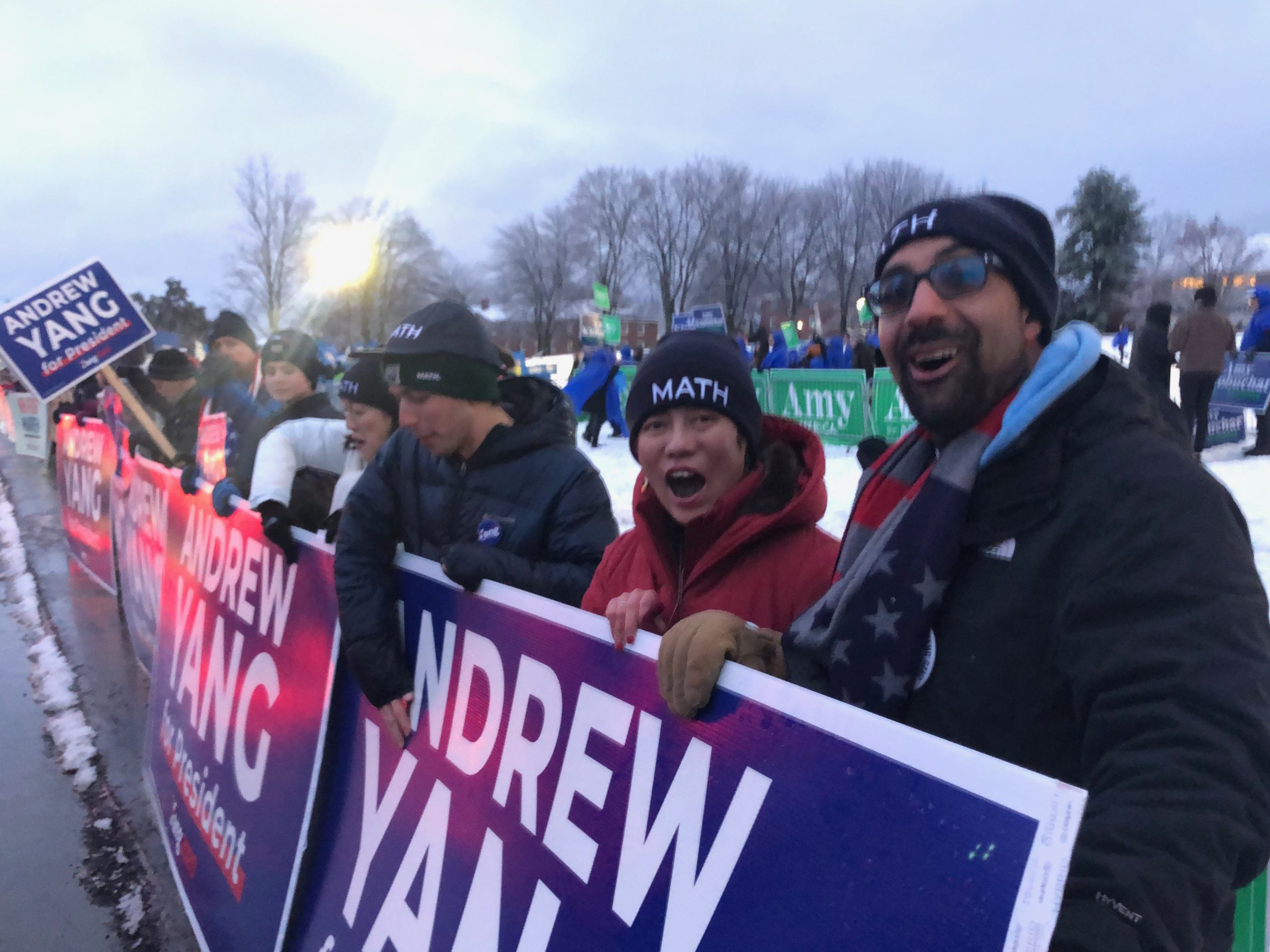
Protest outside of 8th debate, Ching Juhl and Nick Rivera with Yang Gang, at Saint Anselm College, New Hampshire, 2/7/2020
One of Yang’s most popular initiative is the “Freedom Dividend,” what is it exactly and how does it affect people in U.S.A.?
Andrew Yang’s proposal of a Universal Basic Income (UBI) was called the Freedom Dividend, and was intended to provide an annual income of $12,000 for every American age 18 and above with no conditions. Although this proposal was considered radical, the idea of UBI itself is not new. UBI was supported by thinkers such as Thomas Paine as early as the 1790s, as well as by Martin Luther King, Jr., Richard Nixon, and economist Milton Friedman, to name a few. Yang’s Freedom Dividend had solid economics behind it, too. It was intended to be funded by a “Value Added Tax” that would give back some of the value American consumers had been giving away for free. The Freedom Dividend would also reduce stress, improve health and decrease crime. Yang seemed to be the only one recognising these bigger issues. One example of a UBI program within America already exists, in the state of Alaska. Since 1976, the state has been providing its citizens (including children) a yearly check that comes from a “Permanent Fund Dividend” funded by the state’s oil production. Much like this program, Yang’s Freedom Dividend hoped to return some of the value that Americans’ personal data had been providing to tech companies — for free — back in their pockets.
Yang is not the first politician to discuss money or bonuses being given to citizens. In March 2020, even the Trump administration announced its intention to mail checks to Americans to help them confront the approaching economic threat. What would you say to those who call these initiatives, including the Freedom Dividend, populist and demagogic moves to gain voter support?
Ironically, Andrew Yang suspended his presidential campaign on February 11, 2020, right before the Covid-19 pandemic really began to spread within the United States. His Freedom Dividend seemed more solid than ever as businesses and entire economies had to shut down because of the virus, and a part of me wonders what might had happened if Yang had been able to stay in the race. People who had perhaps been against Yang and his UBI then became among the first to praise the Trump administration for the stimulus checks. Although the factors that made Yang call for his Freedom Dividend were different from those that created the need for the stimulus checks, I think the last year has showed why such programs could be so important. Populist as it may be, Yang’s message was rooted in hard facts and numbers, and it was at least an attempt at an innovative solution.
What campaign tactics stood out, for you, as a Yang Gang member?
Personally, I appreciated Andrew Yang for his being current, being Asian, and his thoughtfulness in implementing mental health, education, and UBI. His campaign slogan of “Not Left, Not Right, But Forward!” was very appealing to me.
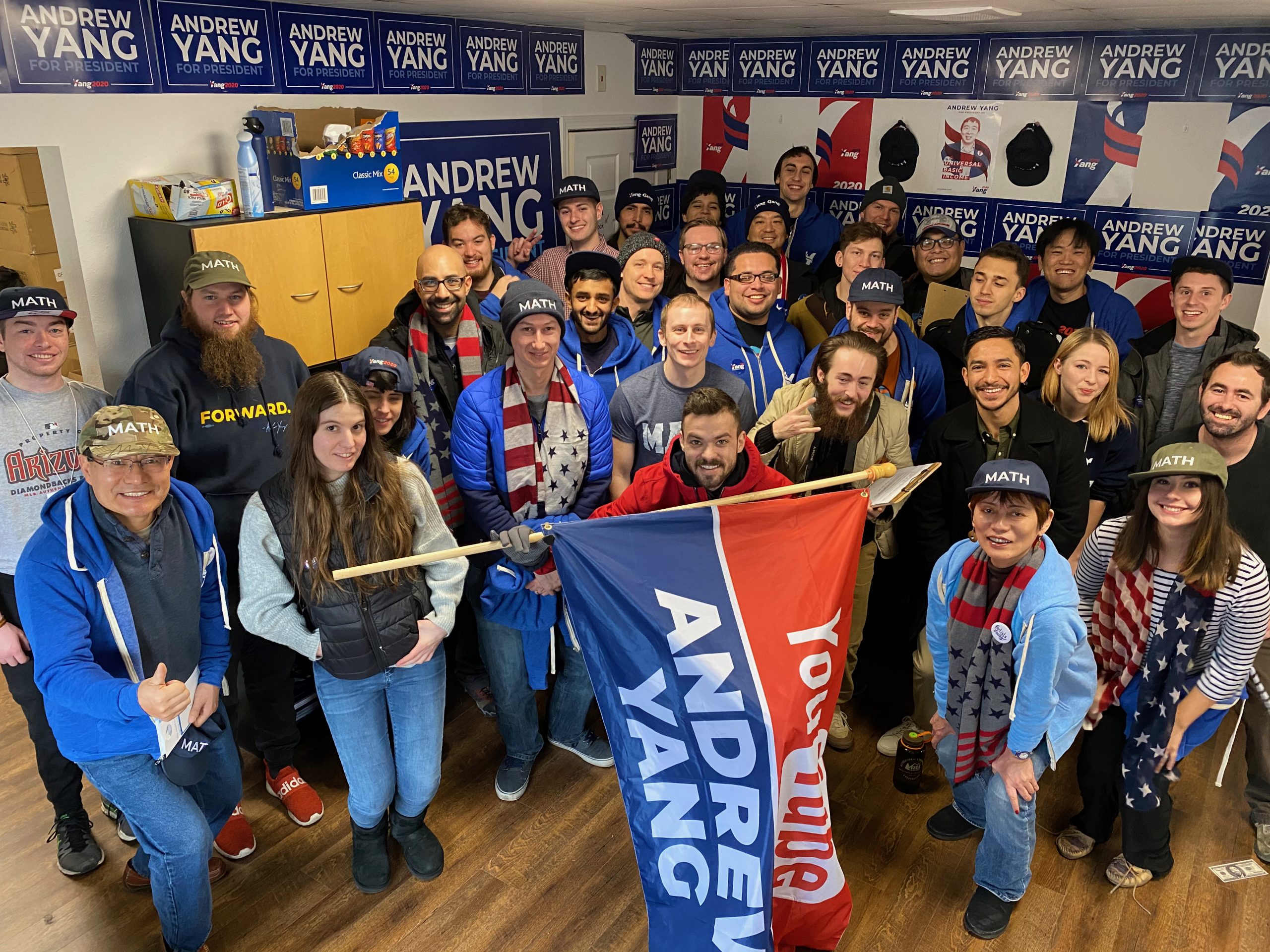
National Yang Gang during Yang Week in Iowa City, 1/6/2020, Photo Credit: Justin Williams
As a Chinese-American how do you feel Yang can change the situation regarding Asian hate?
It has been a long time since an Asian person has run for a presidential campaign. Andrew Yang has set a great example for many people, young or old, and people of all colours. The recent Asian-hate mainly has to do with Trump’s bad mouthing to Chinese and how he called Coronavirus the China-virus, or kung-flu. I am very concerned about the safety and life of my fellow people. Starting January 2021, Andrew Yang is running for New York City mayor. His inclusiveness brings positivity in this uncertain time.
We see many Yang supporters from all walks of life, different races, different states and different jobs. What do you think distinguishes them from those of other candidates?
I have never been this involved with any political campaign before. To my observations, Andrew Yang attracted many younger supporters, while Bernie Sanders’ supporters were more seasoned voters, and the LGBTQ communities for Pete Buttigieg.
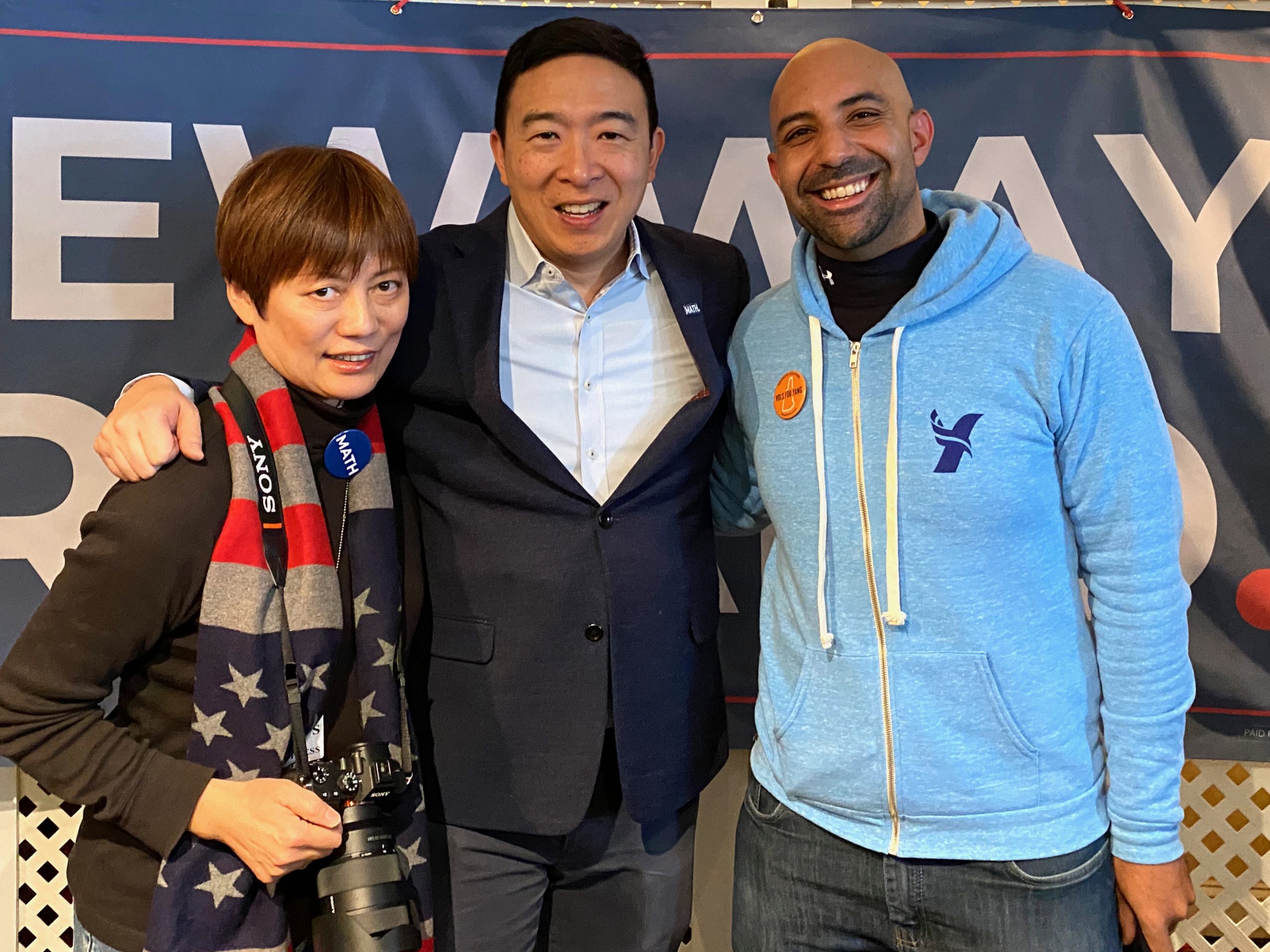
Andrew Yang calls himself “the Asian man who likes math,” and Math has become one of his catchwords. But according to some data, his calculations overestimate the danger of what he calls the Fourth Industrial Revolution, and how technological upheaval will decimate employment in America. As a filmmaker who uses smartphones and last generation technology for her craft, don’t you feel there are also benefits, and new professions stemming out of this upcoming technological era or do you believe that in 10 years’ time we will live the dystopian scenario predicted by Yang?
I am so so at math. Andrew Yang’s MATH also means: Make America Think Harder. I strongly believe that technology definitely helps artists like me to tell stories and to create original content. History is in the making, good and bad. We don’t know what will happen for sure in 10 years, economically, environmentally and socially. I am hoping for the best and prepare for the worst.
Do you ever regret quitting your job as a music teacher, to follow Yang’s campaign?
In December 2020, I signed up for Yang Week, joining in hundreds of Yang Gangers to canvas in Iowa for Andrew. I decided to quit my adjunct professorship, so I could be free to follow the movement. I went to Iowa for 2 weeks and drove to New Hampshire, and ended up staying for 3 weeks. As much as I enjoy educating young people about classical music, jazz and Chinese music, I do not regret quitting my college teaching job. I taught the same course for 15 years, and I was ready to take on newer challenges.
As a Chinese woman, who lived the American Dream, how do you feel about Asian representation in the USA, and do you think Andrew Yang has and will play an important role in this?
I was born in Shanghai, came to the USA 35 years ago with $30 dollars. I feel very lucky, because I went to graduate school with full scholarships, got jobs, and became a home owner and a mother. I love Chinese food and have many Chinese friends, but I don’t think myself as an Asian woman often. Maybe it is because I have lived in New York City for more than 20 years, married to my husband, a half German and half Welsh who was born in Queens. NYC offers diversity and ethnicity that I feel all people are one. I believe Andrew Yang, ABC, (America born Chinese), is playing an important role in representing the Asian community. He raised the bar of political activism, saving the unprivileged and the humanity forward movement, to a much high level.
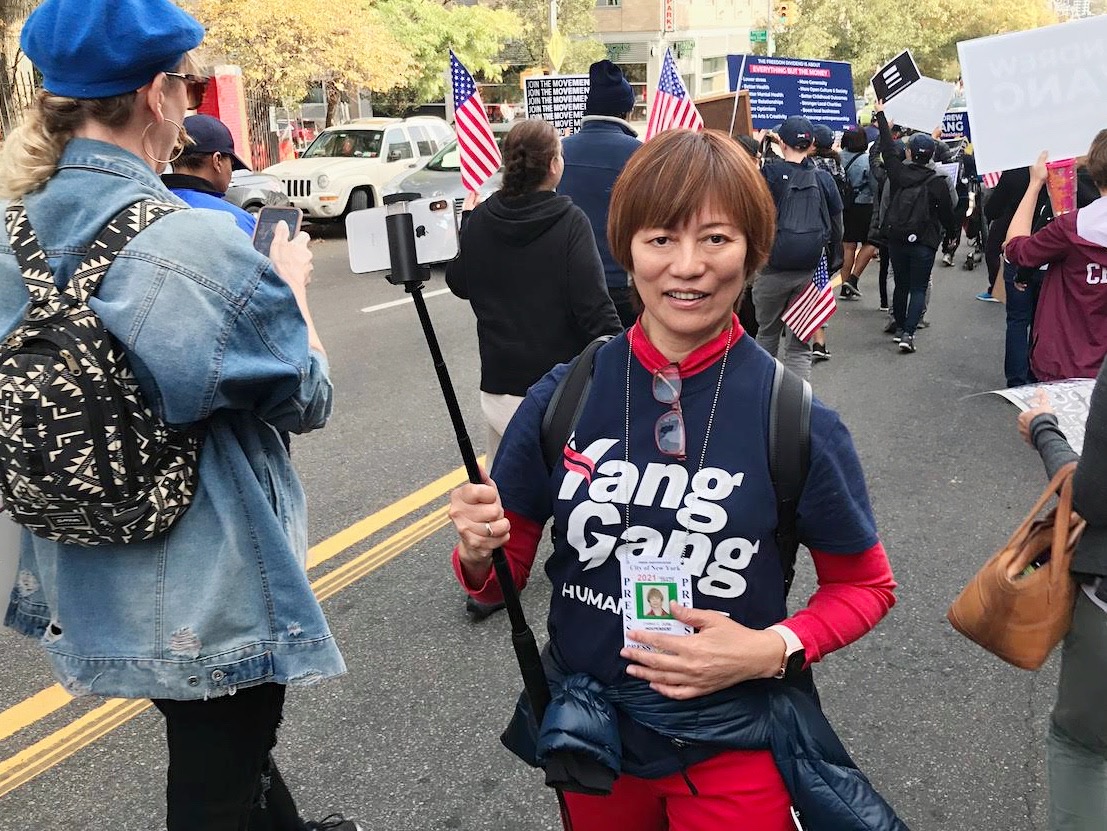
Ching Juhl at UBI March in New York City, 10/26/2019

